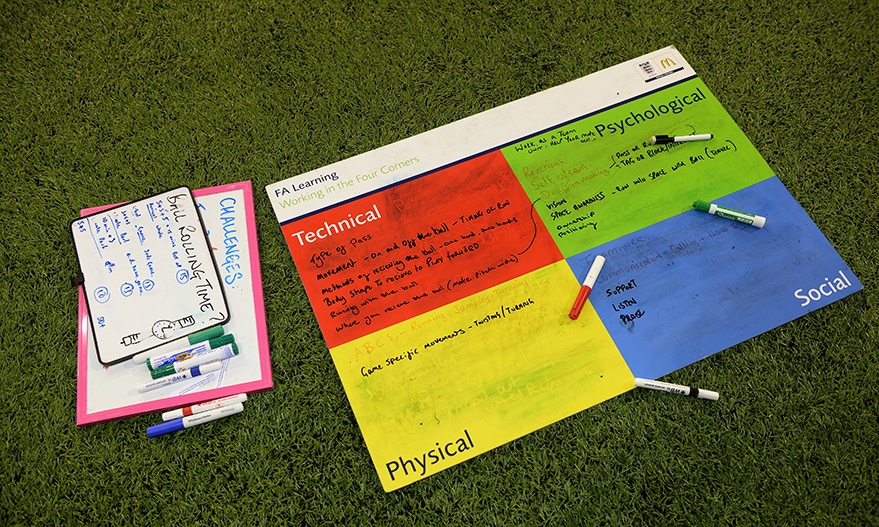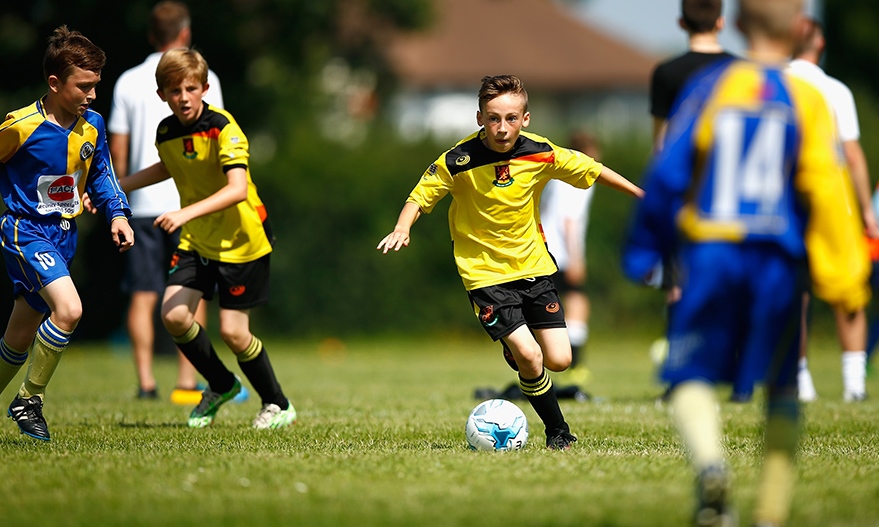Lee Brown, FA coach development officer, explores how you can provide personalised support to your players.
For lots of coaches, this is the million-dollar question
Whether you work with under 7s, under 14s or adult players, the challenge is always the same. In this blog, I’ll talk through a simple approach to personalised support.
First up, we need to recognise that every person is, and will remain, unique.
Think about Harry Kane and Tammy Abraham. Both play in the same position and score goals – but they’re individuals too, with varying experiences and strengths.
From childhood to the professional game, they’ve never been ‘the same’.
Every player is different...
... technically, physically, socially and psychologically. Once we’re comfortable that this is something we can’t change, we can consider how to help. When it comes to personalised support, The FA 4 Corner Model is a great starting point.

To give it a go, consider a player in your squad and try to list one thing from each corner that they could improve on.
Let’s use Joel as an example

Joel is an U13 player for his local grassroots club.
Using the model, I’ve identified that he could improve in the following ways.
- Technical improvement: dribbling past defenders to put crosses in the box.
- Psychological improvement: keeping his cool after making obvious mistakes.
- Physical improvement: using his body to shield the ball when under pressure.
- Social improvement: resisting the peer pressure of poor behaviour.
But what do I do with this information?
Well: it’s Tuesday night, 7pm and drizzling with rain. The floodlights are on, I've set up my coaching session and the squad is arriving in dribs and drabs.
In walks Joel. I want to help him with dribbling in 1v1 situations and, subsequently, crossing the ball. And I’ve got a plan.
Just like the rest of the team, Joel is obsessed with playing a match. My goal is to mix Joel’s want (the match) with his need for technical improvement.
So, once the team are ready to go, I set Joel one of the following tasks. They’re specifically designed to help develop his technical skills while he plays a match.
- Secret mission
In tonight’s match you’ve got a secret mission to set-up goals from crosses after you’ve dribbled past a defender. How many would you like to challenge yourself to set-up in 20 minutes?
- Challenge
When you receive the ball in either wide zone I’ve marked out, try to beat a defender and put a cross in as often as possible
- Restriction
You’re locked into this wide channel. You’re locked in because I want to help you with dribbling and crossing. You can come out to help defend and attack crosses from the opposite wide channel.
- Reward
Each time your team score from a cross that Joel puts in the goal is worth three.
Mixing a player’s wants and needs is a great way to maximise engagement. Setting tasks can also be useful on matchday – it's a simple way to link training to competition.
So, how do I choose what task to use?
Understanding what motivates Joel and his resilience to success and failure can help to inform your decision. For example:
- Restricting Joel may increase frustration to the point of disengagement or inappropriate behaviour. Others may thrive on a restriction and find ways to overcome the challenge.
- A secret mission maybe too immature for some. But Joel could love the personal 1-1 interaction with the coach.
Your role is to create an engaging experience for your players
To do this, you’ll need to adopt a trial-and-error approach. This means plenty of patience when the tactic you selected doesn’t work – believe me, you’ll get it wrong before you get it right! But, once you've hooked your players, you’re perfectly placed to provide appropriate support and guidance.
You just need to give it a go. Your team will love the personalised support – and playing loads of match time. Plus, they may well come on leaps and bounds.
Extend your learning
- Consider what tactics could help Joel in the physical, social and psychological corners.
- How to use constraints in your coaching session
- How to work effectively with individuals
Imagine the power of developing your ability to support every individual in your squad.
Author biography:
Lee Brown is an FA coach development officer, focusing on supporting grassroots coaches, with a specific emphasis on diversity and inclusion.
Prior to this, Lee worked as a county coach developer for The FA and was also the community manager at St. George’s Park. His experience in coaching, supporting coaches and leading development programmes have also seen him work in the professional game, at a county football association and within local authority, since the start of his coaching journey in 1997.
According to Lee, the major influences on his work are, The FA's very own Pete Sturgess, a guru for understanding Foundation Phase players. James Gee, an American academic who helps people understand learning principles embedded within video games and their relationship with education. Former FA coach educators Dennis Mortimer and Noel Black, who provoked curiosity to increase the understanding of the technical and tactical side of the game
Lee's advice for coaches: players don't care how much you know until they know how much you care.


